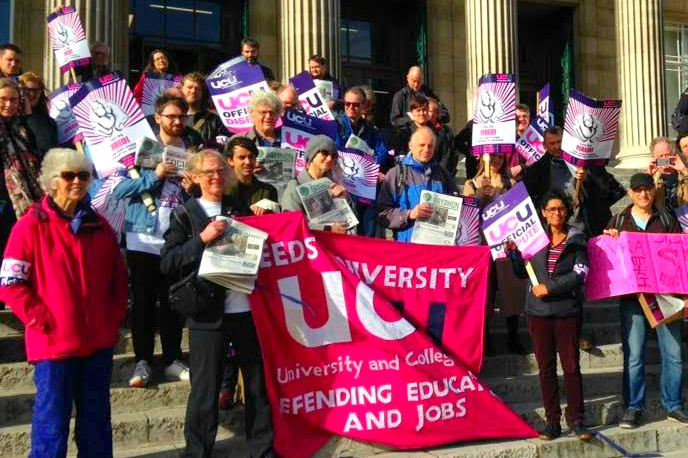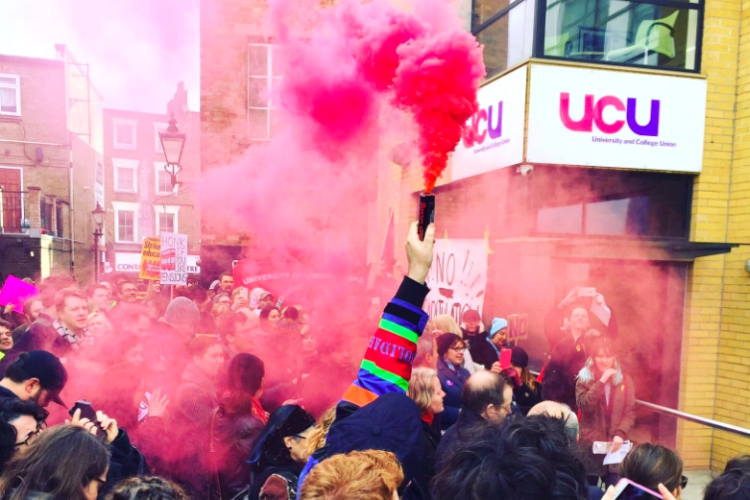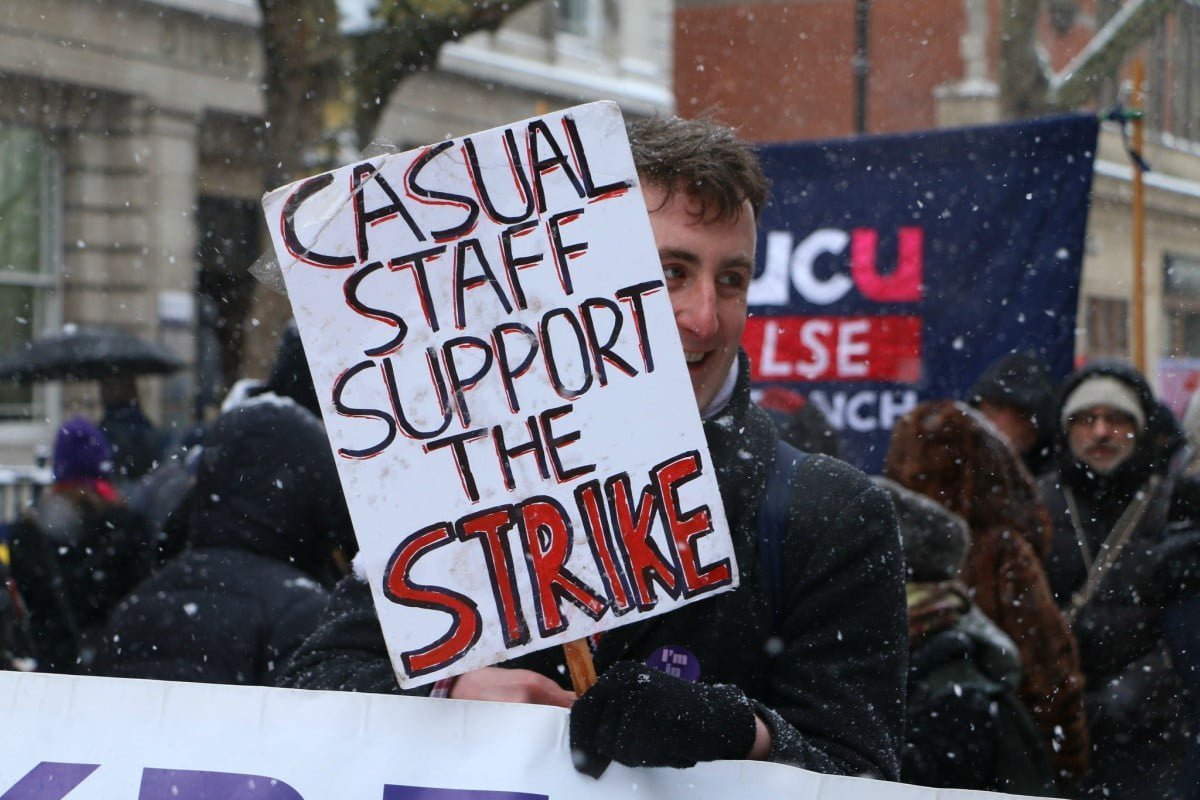The pandemic has exacerbated existing issues surrounding representation amongst junior researchers, who are facing this crisis without any basic rights or safety net. But UCU members are organising a fightback.
We publish here an open letter by several UK-based researchers, who are part of @PandemicPGRs: a network of Post-Graduate Researchers (PGRs) from across various universities, subjects, years and funding models.
Post-graduate staff in higher education are getting organised to demand the only form of furlough available: blanket funded extensions for all. But their struggle doesn’t stop there. These junior researchers are also fighting to be recognised as workers.
No safety net
The ongoing COVID-19 crisis has meant many postgraduate researchers are facing existential hardships. Yet the issues we are facing now are not new. Take for example the staggering mental health problems hitting PGRs, or the precariousness and sharpening of inequalities in the Higher Education (HE) sector that have been at the heart of the ongoing UCU Four Fights dispute.
The pandemic has massively exacerbated these issues. Most PGRs have now not only lost their income, but also the means to progress with their research at all. We are at risk of being driven out of the HE sector entirely.
The specific precarity many of us face today stems from the ambiguity of our status in the UK HE sector. Although the research we produce is financially profitable to our universities, we are considered as ‘students’ paying for a service. This in turn means that we are stripped of basic working rights and meaningful representation – both of which are crucially needed to face this crisis with adequate means.
Today, the full extent of this condition has hit many postgraduates. Although not able to work, PGRs cannot access the furlough scheme. For most, there is not even paid sick-leave in the event that we catch COVID-19. Classed as ‘full-time students’, we cannot apply for Universal Credit. Taking a leave of absence means losing our stipend, and, where applicable, our visa.
Universities across the UK have refused to negotiate the terms and conditions of postgraduate research under COVID-19 with the recognised union UCU, or the National Union of Students. PGRs have been told to be patient and wait until the ‘real issues’ have been dealt with.
Five weeks into lockdown, the universities funding body UKRI proposed six-month funded extensions for final-year PGRs. This was a step in the right direction, if only a limited one. But UKRI backtracked on this partial safety net, after consulting and ‘clarifying’ the conditions for these extensions with the Russell Group of universities. It is now promoting a restrictive and fundamentally discriminatory case-by-case approach.
The guidelines that have been issued – seven weeks into lockdown (!) – indicate that no one will actually qualify for the full six-month time period. This pushes the burden of proof onto postgraduates, and many of the researchers themselves into further impoverishment.
A PhD is not a hobby
 Some of us have been ‘lucky’ enough to have been ‘awarded’ funding for our work, at a rate of £8.30 an hour for a full-time research stipend at best. Yet many do not even get that level of recognition and are left in this crisis without any safety net whatsoever.
Some of us have been ‘lucky’ enough to have been ‘awarded’ funding for our work, at a rate of £8.30 an hour for a full-time research stipend at best. Yet many do not even get that level of recognition and are left in this crisis without any safety net whatsoever.
A lot of us pay extortionate fees – ranging from anywhere between £4,260 for UK and EU PGRs, to over £43,000 a year for other international researchers – in order to conduct research for the university, publishing houses, and companies.
Many PGRs take on a lot of teaching – paid at the lowest grade possible – to pay for rent and food, fees and research expenses. But, since our hours are not guaranteed, many have to take on several part-time jobs in other sectors, and end up doing their research in their ‘spare time’. Talk about free labour – this is self-paid labour!
Stripped of proper representation, PGRs are left to the language games of management groups trying to frame exploitation as ‘experience’, and PGR original research work as a ‘journey’. For those who are self-funded and struggle to make ends meet every month, it surely is an expensive hobby.
COVID-19 hits a broken sector
COVID-19 did not hit a healthy and otherwise functional system. The hardships we, alongside many of our colleagues, are now facing are not caused by COVID-19. They are symptoms of a deeper problem with the UK HE system.
Years of marketisation have made the sector particularly vulnerable. Today, while publicly-funded universities outside the UK are significantly less affected by market fluctuations, HE is one of the hardest hit sectors of the British economy, ahead even of the construction and hospitality sectors.
Warnings have been raised before about the unsustainability of an educational system dependent on rising student fees and increasing numbers of international students, to overcome the reduction of direct public funding. This crisis has shattered the false claims that fee-based funding of universities would allow these institutions to be financially stable and independent from politics.
The employers, many of them on six-figure salaries, have jumped on the opportunity to increase the pressure on the most precarious in the sector. Since the government refused a bailout, Glasgow, Sussex, and Goldsmiths have already sacked their postgraduate teaching assistants and announced cuts to the available teaching positions next year.
It goes to the Chancellors and Vice Chancellors who are on SIX FIGURE salaries? https://t.co/aVDg3UU0cm
— mira (@meerahmai) July 6, 2020
A thin lifeline for many PGRs has thus been cut, and our chances for ever getting a job in the sector have been greatly diminished. No doubt this will be used to force researchers on fixed-term contracts and full-time staff to accept pay cuts, increased workloads, and hourly paid work, as institutions are forced into a race to the bottom.
We demand system change
 The competition to recruit more students, both nationally and internationally, has led to significant funding gaps between universities in the UK. Every year universities spend ever more money on shiny buildings and lucrative student accommodation, and less on the ones who actually provide the education they offer.
The competition to recruit more students, both nationally and internationally, has led to significant funding gaps between universities in the UK. Every year universities spend ever more money on shiny buildings and lucrative student accommodation, and less on the ones who actually provide the education they offer.
These speculative enterprises, as well as the inflated salaries of senior management teams, have only been made possible thanks to the huge amount of temporary and zero-hour contracts, as well as unpaid work.
As long as universities are subject to the law of the market, this will remain a broken system, using unpaid postgraduate labour to drive down the working conditions for all in the sector.
Our more immediate fight for blanket funded extensions needs to go hand in hand with the fight to restructure the UK Higher Education into one in which PGR research is recognised as work – and PGRs as workers. One in which universities are publicly funded and run by the students and workers themselves – not by managers on six-figure salaries.
For this, we need to organise:
- Sign our letter and follow the group on twitter @PandemicPGRs;
- Join your UCU branch;
- Get in touch






